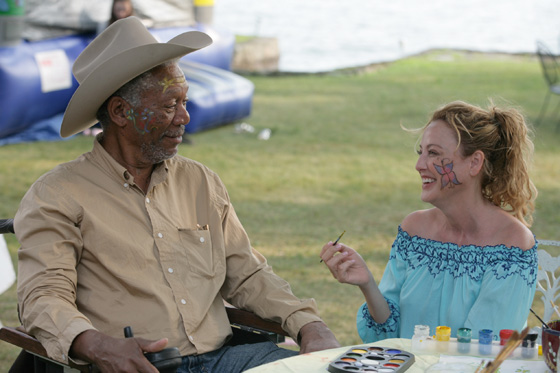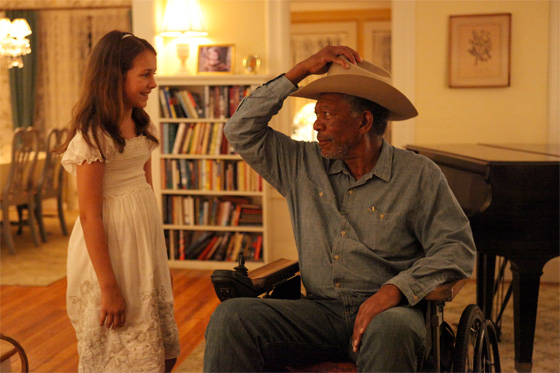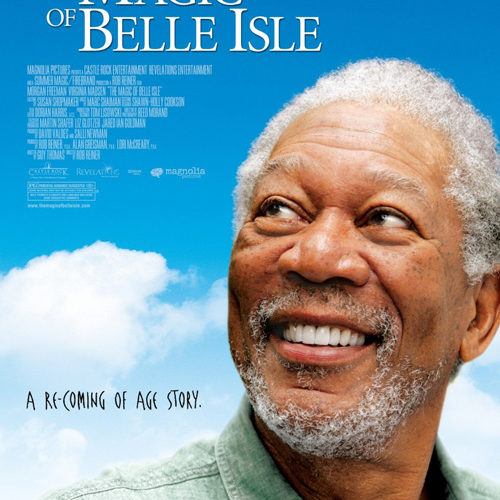As the years progress and his workload diminishes, director Rob Reiner has chosen to spend his time bringing what he calls “life-affirming material” to the big screen. Despite the surprising success of The Bucket List in 2007, however, such a decision carries smaller budgets, fewer screens, and less exposure while allowing more creative control on work appearing to possess a very personal hold. After the underrated coming-of-age story Flipped proved he had a bit of Princess Bride era storytelling prowess left, The Magic of Belle Isle shows message can trump lackluster material better-suited to made-for-TV territory if enough heart shines through. Reiner is fulfilling a newfound desire to expose how life doesn’t truly end until your last breath is taken and he’s unafraid to forgo wide releases and mass appeal to achieve it.

Working off of a script from Guy Thomas, Reiner reunites with Bucket List star Morgan Freeman to bring an award-winning Western novelist in his twilight years to life. Saddled by tragedy, Monte Wildhorn is a drunk confined to a wheelchair with the use of only one arm—making optimism a tough concept to admire. So, when nephew Henry (Kenan Thompson) attempts to reinvigorate his talent after his typewriter has collected dust for six years, a summer in idyllic Belle Isle seems like the perfect dose of quiet serenity to let an imagination run wild. Surly, unsocial, and happy to cynically lord his intellect over the cheery citizens outside his borrowed door, an inevitable wake-up call towards life’s hidden treasures is an unsurprising reality after the O’Neil family women are introduced harmlessly bickering next door.
Wildhorn is a modern-day Scrooge with the power to make people listen who only town mayor Al Kaiser (the incomparable, self-effacing Fred Willard) recognizes as a celebrity. Sharing this realization with the locals at the funeral of someone Monte never met, the author’s old-fashioned formalities used to keep people at a distance becomes his demise as they make him unable to refuse an invitation. Attending the potluck with a bag of Cheetos on his lap and a thirst for free booze, the seemingly crotchety old man also brings an imaginative set of self-defense mechanisms used to make others uncomfortable. Unfortunately for him, tall tales about pretending to be cripple as part of an elaborate ruse to win a million dollar lawsuit is exactly the sort of discomforting bamboozling young Finnegan O’Neil (Emma Fuhrmann) yearns to learn.
Admittedly based on Harper Lee‘s fantastically drawn Scout from To Kill a Mockingbird, Fuhrmann’s curious child with a streak of temper amidst her parents’ impending divorce becomes the lynchpin to the proceedings. Troubled by her absentee father’s refusal to help finish the homemade raft they would take to the town’s namesake island as promised, she acts out by scaring younger sister Flora (Nicolette Pierini) with stories of worm-eating monsters and locks horns with older, jaded sibling Willow (Flipped‘s Madeline Carroll). A sponge for learning, however, Finn takes a shine to Monte as someone who can conjure the invisible into reality. Agreeing to pay him her life’s savings for lessons on how to utilize this newly discovered concept of imagination, what begins as a way to appease an annoying little girl becomes the impetus towards a defeated man’s rebirth.

Wildhorn’s steady thaw brings little to the table we haven’t already seen before. With his own skeletons yet to be uncovered, it’s the fascination of a young girl’s desire to hone the gift he threw away that allows him to acknowledge his selfish ways. The beauty of her mother Charlotte (Virginia Madsen) doesn’t hurt matters as her own propensity for etiquette straight out of the 40s stirs a long-dormant romantic sensibility within him. Her playing of Beethoven at night lets inspiration rise from the ashes and quell the death that has followed him too long from dictating his life anymore. A natural progression of tried and true tropes on behalf of emotionally damaged characters, the journey remains cutely heartwarming as it approaches its obvious yet fitting end.
Even the inclusion of Carl Loop’s (Ash Christian) mentally challenged bunny hopper proves endearing when Monte enlists him as his outlaw sidekick Diego Santana. Overlooking the fact Thomas uses the character as a pawn for Wildborn to manipulate and ‘write’, we forgive the cliché due to the film’s family-friendly penchant of magically altering Belle Isle citizens for the better. A fallen angel of sorts, this angry, troubled novelist can still embody Jubal the cowboy from his stories to save the day despite the overwrought, easy parallels between he and the fictional persona. And while it’s admittedly hard to believe a nine-year old doesn’t understand the concept of imagination minutes after making up a story to scare her sister, The Magic of Belle Isle works as a sweetly touching tale if you remember the impressionable audience of Finns it targets.
The O’Neil girls each embody a different stage of angst that will surely be relatable to young girls watching in the audience as they realize they aren’t alone in their struggles with divorcing parents. Coping with the harshness of reality through stories and laughter works wonders for them as well as the adults as both Charlotte and Monte find themselves dreaming of happiness once thought gone. Freeman and Madsen are at their best delving into the complex relationship shared as muses inspiring each other to wake up and strive for more. Not as three-dimensional as the filmmakers probably think, their characters do possess a withering creative drive and love that needs a jumpstart. Devoid of the tacky sexual tryst this type of awakening usually utilizes due to the film’s PG-rating, imagination truly is king when life amongst friends becomes reason enough to smile.
The Magic of Belle Isle is now in limited release and on VOD.

